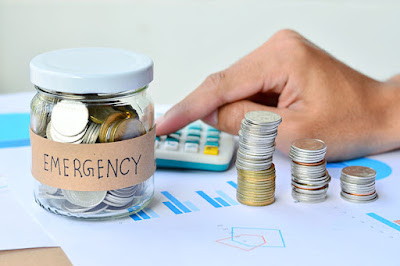Emergency Fund - What is it, why is it so important and How to create it.
An emergency fund is a set amount of money that you set aside specifically for unexpected expenses or emergencies. Having an emergency fund can provide financial stability and peace of mind, especially in times of uncertainty or crisis.
One of the main benefits of an emergency fund is that it can help you avoid going into debt. If you don't have an emergency fund and an unexpected expense arises, you may be forced to charge it to a credit card or take out a loan, which can be financially detrimental in the long run. Credit card debt and loans often have high interest rates, which can make it difficult to pay off the balance in a timely manner. By having an emergency fund, you can pay for unexpected expenses with cash, rather than accruing more debt.
An emergency fund can also help you weather financial storms. Unexpected expenses, such as car repairs or medical bills, can be stressful and disruptive to your finances. If you have an emergency fund, you won't have to worry about finding the money to cover these expenses, as you'll have the cash on hand to pay for them. This can provide a sense of financial security and reduce stress during difficult times.
In addition to helping you avoid debt and providing financial stability, an emergency fund can also help you reach your long-term financial goals. If you don't have an emergency fund, unexpected expenses can throw off your budget and make it difficult to save money for the future. With an emergency fund in place, you can continue to save and invest for your future, even if you encounter unexpected expenses.
Overall, an emergency fund is an important part of a healthy financial plan. It can provide financial stability and peace of mind, help you avoid going into debt, and allow you to continue to save and invest for your future. If you don't have an emergency fund, it's a good idea to start building one as soon as possible.
Creating an emergency fund is a simple process, but it does require some planning and discipline. Here are a few steps to help you get started:
Determine how much you need: The first step in creating an emergency fund is to determine how much money you need to save. A good rule of thumb is to aim for three to six months' worth of living expenses. So, if your monthly expenses are ₹ 50,000, you should aim to save between ₹ 1,50,000 and ₹ 3,00,000. This may seem like a lot, but having a larger emergency fund can provide extra financial security in case of a prolonged emergency.
Set a goal: Once you know how much you need to save, set a specific goal for yourself. For example, you might aim to save ₹ 10,000 per month until you reach your desired emergency fund amount. Having a clear goal will help you stay motivated and on track.
Make a budget: To save for your emergency fund, you'll need to make a budget that includes a savings category. Look at your income and expenses and see where you can cut back on unnecessary expenses in order to allocate more money towards your emergency fund. You might also consider finding ways to increase your income, such as taking on a side hustle or negotiating a raise at work.
Save automatically: One of the easiest ways to save for your emergency fund is to set up automatic transfers from your checking account to a savings account. This way, you won't have to think about it – the money will be transferred automatically each month.
Be patient: Building an emergency fund takes time, so be patient and stay committed to your goal. It may take several months or even years to reach your desired emergency fund amount, but the peace of mind and financial stability it provides will be worth it in the long run.
Remember, building an emergency fund is an important step towards financial stability. By following these steps, you can create a fund that will provide security and peace of mind in times of uncertainty.
For more details contact us at
contact@finviseindia.com
Or visit our websites:
www.finviseindia.com
www.fvindia.com




Comments
Post a Comment